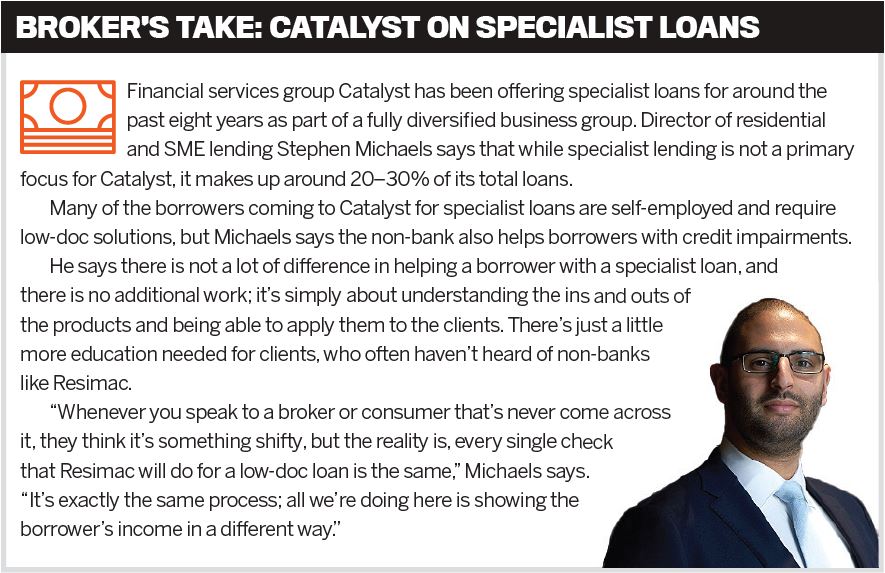How can specialist loans serve the needs of your non-traditional clients? Daniel Carde of Resimac shares his insights

One of the common criticisms levelled at the traditional mortgage system is that it can be, well, exclusionary. Life does not treat everyone equally and can throw all manner of unusual circumstances at people.
Failing to fit the ideal standard espoused by banks can lead to a tough situation, rendering people unable to secure finance for their home or business. Self-employed borrowers, credit-impaired borrowers, contract workers, borrowers who have reached their exposure with mortgage insurers – among others – have all found themselves unfairly stung as a result of the rigidity inherent in the current system.
“The primary challenge is understanding what solutions are available to meet borrowers’ needs and shifting your mindset accordingly” Daniel Carde, Resimac
Enter specialist loans. Growing in popularity in the wake of the 2008 GFC, specialist loans have a broader risk profile and cater to a wider variety of borrowers. Given the unusual circumstances of 2020, it’s likely that these loans will see another surge in popularity as people look for new ways to secure finance for their homes, businesses and investments. For brokers who aren’t already working with specialist loan providers, now might be a highly opportune time to consider doing so.
 Daniel Carde, Resimac’s general manager – distribution, describes specialist loans as “solution-based”: they’re geared towards finding novel solutions for borrowers who find themselves in unusual situations.
Daniel Carde, Resimac’s general manager – distribution, describes specialist loans as “solution-based”: they’re geared towards finding novel solutions for borrowers who find themselves in unusual situations.
While there has previously been some stigma associated with such loans, Carde notes that this has been changing for some time. Much of the shift in attitude has been driven by changes to traditional loan criteria as lenders grow more conservative in the wake of falling interest rates, along with a host of other economic factors. As the idea of a ‘traditional’ borrower shifts, the market needs to adjust accordingly to accommodate the new breed of borrowers.
“Really, specialist loans cater to any borrower who may fall outside traditional banks’ or lenders’ mortgage insurance guidelines,” Carde explains. “It’s a common misconception that this applies solely to impaired borrowers, but that’s just not true. Many of the specialist loans that we write are for self-employed people, or for borrowers that we classify as being ‘clear’ credit.”
The key to offering these loans is understanding the client scenario you’re trying to solve, notes Carde. It’s crucial for borrowers and brokers alike to understand and recognise that a specialist loan can be a ‘point in time’ lending solution – the borrower may qualify for a prime loan down the track, and refi nancing may be possible.
“Brokers need to be able to take their borrower on a journey to help them understand why they don’t qualify for a prime loan at that point in time,” says Carde.
“How and why will a specialist loan provide the solution to that client scenario? It could be a larger loan, with an attendant larger loan-to-valuation ratio, or a shorter-term solution for a client who is on their path back to prime lending.”
Carde believes that brokers should be confident about being able to provide specialist loans. The lending criteria are essentially the same as for prime loans; the fundamentals of serviceability, security and suitability do not change.
“Specialist loans are also assessed in accordance with responsible lending guide-lines,” says Carde. “Given the ever-shifting borrower landscape, off ering specialist lending gives the broker the opportunity to help more borrowers more of the time.”
Carde points to a variety of Resimac’s specialist loan features. The company has a long-established presence, product offering and processes in place to cater for this borrower type, offering both full-doc and alt-doc loans, and lending solutions for both clear credit and credit-impaired borrowers.
“Our specialist loans have all the same features as a prime loan – redraw, off set, loan access cards, repayment options, interest-only options, and so forth,” says Carde.
“We have an extensive track record of working effectively with brokers to help them meet their clients’ specialist lending needs, as well as experienced underwriters dedicated to handling specialist loans.”
Of course, no discussion around loans would be complete without a discussion of risk. Brokers understandably have their own reputations to consider, in addition to the needs of their clients.
For his part, though, Carde believes there aren’t any particular additional risks for brokers looking to make a move into this territory – provided, of course, that they do their due diligence, which should of course be the case with any loan.
“The primary challenge,” Carde says, “is understanding what solutions are available to meet borrowers’ needs and shifting your mindset accordingly. Just because a borrower doesn’t meet traditional lending guidelines doesn’t mean they can’t be approved for a loan.”
However, if a situation should arise in which a broker is unsure of the appropriateness of a given specialist lending solution, Carde cautions that the best thing they can do is contact their business development manager.
“Given the ever-shifting borrower landscape, off ering specialist lending gives the broker the opportunity to help more borrowers more of the time” Daniel Carde, Resimac
“I can’t stress enough the importance of developing a good relationship with your business development manager,” says Carde. “Due diligence is critical under any circumstances, but brokers should also always make sure there’s full disclosure from the client as well. Having a good relationship with your BDM will absolutely aid in that process.”
With these considerations in mind, Carde also notes that ongoing education is critical for any broker looking to delve into specialist loans. As with any other product, the market undergoes periodic shifts, and it’s crucial to have a good grasp of best practice.

“We invest considerable time and effort in helping brokers understand specialist loans and the changing lending environment,” he says. “We have a continuing education program through our broker updates and masterclasses, and our BDMs are fully versed in our products, policies and processes.”
Looking to the future, Carde sees an evolving landscape in which there will be increasing demand for specialist loans. Even leaving aside the short-term developments associated with the COVID-19 pandemic, there are longer-term social and economic trends that will contribute to this.
Carde points to changes in employment patterns, such as more people being self-employed. These will present challenges from an economic point of view and are likely to lead to exclusion of many borrowers from more mainline products.
“Brokers who can provide specialist loans will be able to satisfy the lending needs of a larger number of potential customers,” says Carde.
“Mainstream lenders are unlikely to enter this area, as it’s specialised risk-based lending. And given the variety of products, brokers don’t need to worry that their clients are being short-changed simply by taking out a specialist loan. They don’t have to be low on features compared to prime loans.”



